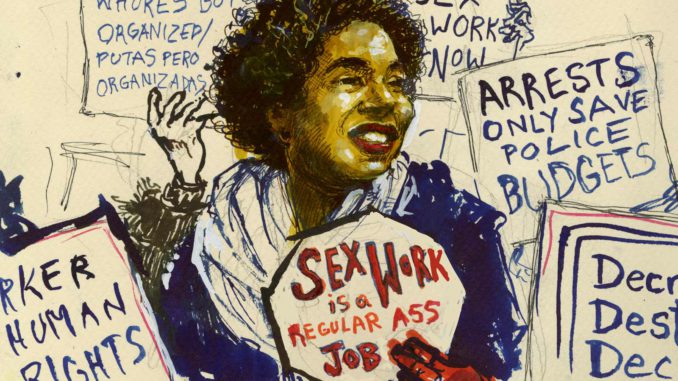
By Charlotte A
Sex workers have spent decades fighting for decriminalization of their livelihood. Recently, their demands have moved into the limelight in New York. Decrim NY, a coalition of sex workers, allies, and partner organizations, is leading the push for New York to become the first state to decriminalize sex work. NYC-DSA has joined the battle and played a key role in the Cabán primary campaign, a recent victory for the movement.
Decriminalization is the removal of criminal penalties for provision of sexual services, performances, or products in return for material compensation; it’s a step towards full legalization and regulation, and a key demand for advocates.
NYC-DSA’s Queer Caucus and Socialist Feminist Working Group have both joined Decrim NY, a grassroots group formed by sex workers in February to keep their communities safe. The coalition seeks to shape policy and public opinion around people in the sex trades, in order to “decriminalize, decarcerate, and destigmatize” their work and “improve the lives of people who perform sexual labor, whether by choice, circumstance, or coercion,” as well as communities impacted by the criminalization of sex work.
Sex workers rights gained national media attention in April 2018, when Congress passed the Stop Enabling Sex Traffickers Act (SESTA) and Allow States and Victims to Fight Online Sex Trafficking Act (FOSTA), sparking their highly visible and organized opposition. While proponents claimed the law was intended to “protect” victims of sex trafficking, SESTA/FOSTA further criminalized and endangered sex workers themselves, as NYC-DSA’s Steering Committee noted in a statement released on June 28.
The Steering Committee’s statement calls for the full decriminalization of sex work and repeal of SESTA/FOSTA. It also urges Bernie Sanders, the candidate our chapter has endorsed for president, to disavow his previous position on the bill and support decriminalization. “SESTA/FOSTA has made sex work tremendously more dangerous by shutting down websites sex workers use to connect with and screen clients,” the statement reads. Without an online system to advertise and choose clients, sex workers are forced into unsafe conditions, with fewer advance precautions in place and no way to ensure that they work in safe locations.
Tiffany Cabán was the only candidate for Queens DA who promised not to prosecute sex workers for loitering and other offenses, and who supported decriminalization of both selling and buying sex. If her narrow margin of victory in the June 25 Democratic primary survives the counting of mail and affidavit ballots, the queer, Latinx public defender and DSA member will almost certainly become the next Queens DA in January. Sex work could in effect be decriminalized in Queens. Her decarceral mindset and commitment to harm reduction is why many sex workers strongly supported Cabán’s candidacy and one reason NYC-DSA endorsed Cabán and campaigned for her vigorously.
State Senator Julia Salazar, a DSA member, alongside Assembly Member Richard Gottfried, introduced the Stop Violence in the Sex Trades Act in June. In addition to removing criminal penalties for adults buying and selling sex, the bill would amend other statues that punish or endanger sex workers. “This actually speaks to exactly how pervasive the criminalization of the sex industry is,” said Sen. Salazar, “that it touches so many parts of the law the average person doesn’t think about when they think about prostitution being illegal.” Another bill introduced this year would allow survivors of sex trafficking to vacate criminal convictions for crimes committed while being trafficked. A third would repeal a “loitering-for-prostitution” law.
“Decrim NY’s policy team had a big role in developing the package,” said Noah Z, a member of the Socialist Feminist Working Group’s Organizing Committee who coordinates the working group’s efforts to support the campaign. “SocFem’s role right now is helping with the public outreach side of the campaign, specifically canvassing,” Noah said. So far, there have been two canvasses focused on combating myths about the sex trade and gathering signatures from people expressing support for the proposed legislation. “I also think that the electoral work people have done for candidates like Salazar and Cabán, and AOC’s stance against SESTA/FOSTA, have helped build the groundwork for us to be involved with this,” Noah added.
Decriminalization is an important demand for socialists in part because it’s a labor issue. “Sex workers are workers,” Noah said. Like other workers, sex workers need wage and hour protections, the right to a union, and freedom from violence or harassment on the job. “We say ‘sex work is work’ not because we want to valorize wage labor, but because we recognize that workers’ rights and safety are always won through struggle, and this struggle is no exception.”
Sex work also exists at the intersection of many struggles important to our movement. Queer and trans people, people of color, undocumented people and migrants, poor people, and disabled people are all more likely to do sex work, often because they are shut out of other kinds of work, Noah added. “Capitalism isn’t identity-neutral, and our fight against it can’t ignore the particular experiences of marginalized workers, or the labor struggles present in gendered, racialized, and frequently precarious sectors, such as the sex industry.”
“Right now, the number one threat to sex workers is criminalization and police violence, so that’s where we’re starting.” But as Noah points out, “freedom is more than ‘freedom from.’ It’s also being able to freely access housing, healthcare, education, and other services.” Sex workers need positive rights, not “rescue,” forced “services,” or restriction from the things they need to make a living. Criminalization and stigma make it difficult for sex workers to access the resources all of us need to survive.
The next SocFem canvass for Decrim NY is July 13 from 2 to 5 pm in Jackson Heights. If you’d like to get involved, sign up for updates here!
